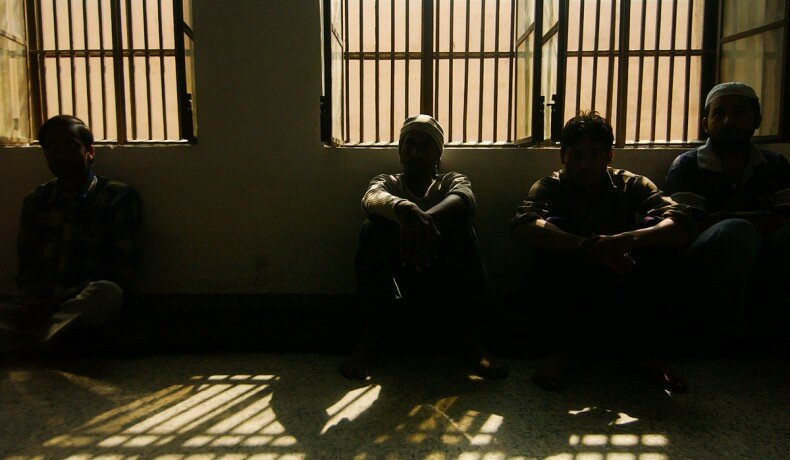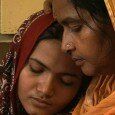By Zulfiqar Kunbhar –
Pakistan and India need revisiting laws revolving around arrest of fishermen mistakenly crossing ‘enemy’ waters
The communities living in the fan shaped delta of Indus River, the lifeline of Pakistan, are entirely different from the rest of the country. Almost entire community gathers at one place whenever a baby is born in the family or they find any big catch. The entire community sings, dances and dines fresh fish as part of celebration. But it did not happen when they both were born. The community performed the ritual silently and they were given the new names. Naseeban and her close cousin Gul Bano have never seen their fathers, though they are now two years old.
Both friends, the fathers of these first cousins, fishermen by profession, left for open sea for fishing to arrange the big party but they never returned. Latter family found that they had crossed what they call it the enemy waters and were arrested by the Indian Navy.
Some three years back, Indian Navy reportedly abducted a group of Pakistani fishermen from Deh (the smallest revenue administrative unit) Athararki of Sindh’s Sujawal district, involved in fishing in open sea included their fathers. Both girls’ dilemma is directly linked to international conflict Pakistan and India share each other in shape of Sir Creek.
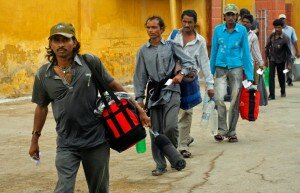 Pakistan and India took on March 04, 2015 first tentative steps towards reviving their stalled peace talks between Pakistani Foreign Secretary Aizaz Chaudhry and his Indian counterpart S. Jaishankar in Islamabad, during which they agreed to make a concerted efforts to resolve Sir Creek issues, beside other issues between both countries.
Pakistan and India took on March 04, 2015 first tentative steps towards reviving their stalled peace talks between Pakistani Foreign Secretary Aizaz Chaudhry and his Indian counterpart S. Jaishankar in Islamabad, during which they agreed to make a concerted efforts to resolve Sir Creek issues, beside other issues between both countries.
The plight of fishermen families is resulted for crossing each others’ waters unintentionally for livelihood purposes. The maritime limits between India and Pakistan remained disputed since partition.
The demarcation of Sir Creek is around 100 kilometre strip of water in Rann of Kutch marshlands, which separates Indian state of Gujarat from Sindh province and opens into Arabian Sea remains another bone of contention between two conventional rivals.
There are around 470 Indian fishermen in Malir prison of Karachi, Pakistan and about 265 Pakistani fishermen in Indian prisons. Around 45 fishermen of Deh Atharki including Khadim, father of Nasseban and Rafique father of Gul Bano are presently in Indian custody since last three years. The families are presently striving hard to survive and often they face starvation.
Khadim and Rafique when abducted were twenty two and nineteen years of age respectively. With two sons in abduction, rests of four sons of Sahib Khatoon are too young to work. On the other hand her eighty year old husband was too old to work.
“Surviving has made our life miserable,” said Sahab Khatoon elderly mother of two brothers. They were ones the landlords with vast lands, which were ones famous for red rice and sugarcane, are now barren land due to the lack of the water in downstream Kotri barrage. “Since agriculture destroyed, we switched from our ancestral profession of farming to fishing,” she said with tears in her eyes. But fate has not left them even when there is nothing left. When they started fishing in the open sea, they are caught by Indian Navy, said Sahib Kahtoon appealing Prime Minister Nawaz Sharif to intervene in the situation to settle down the catching of fishermen issue.
For Asma, mother of Naseeban, abduction of her bread earner husband means always ask help from relatives to fulfill family’s basic necessities. “Just see yourself … I have three kids all in tatter. My kids are crying and they do not get meal on time. It is sometimes very difficult to appease them”, said Asma.
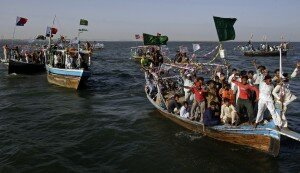 The increasing number of arrest of fishermen and confiscation of their boats has created panic in coastal areas of Sindh. Fishermen are afraid of going to sea to catch fish and this has had adverse effects on their economy and livelihood.
The increasing number of arrest of fishermen and confiscation of their boats has created panic in coastal areas of Sindh. Fishermen are afraid of going to sea to catch fish and this has had adverse effects on their economy and livelihood.
One such family is of Ghani Katiyar (45) who was few years ago involved in agriculture before joining fishing business. Though water scarcity enforced the tribe to set up fish catch, but Ghani could not continue his new job once he was abducted by Indian Navy while fishing. In 2009 Indians caught Ghani’s launch along with eight other fishermen on board. Though group pardoned after spending one year in Indian jail and returned but afterwards Ghani never return back to sea for fishing.
In another incident Indian Navy also arrested Ghani’s son. When he returned he had many health complexities while he was kept in jail. He developed abdomen problems. “Afterwards my son was hospitalised in Karachi’s private hospital where expenses stood around Rs 200,000. I had no source of income. I arranged it from my family friends, zakkat funds and from welfare organisations. Thereafter I never went for fishing nor did I allow my son for it,” said Ghani.
Apart from fishermen’ arrest both Pakistani and Indian authorities are holding around 1000 boats altogether. “A large number of boats are retained despite fishermen being released,” said Muhammad Ali Shah Chairman Pakistan Fisherfolk Forum. The non-governmental organisation is working to advance the goal of social, economic, cultural and political rights of fisher communities in Pakistan.
Shah demands ‘No Fishermen Arrest Policy’ for fish workers on both sides, for the purpose, he says a buffer zone of 100 nautical miles, 50 miles on each side could be established. “There should also be implementation on United Nations Convention on Law of the Sea-Article 73, which stops arrests fishermen while fishing,” the PFF office bearer opined.
In post Mumbai attacks scenario, the fishermen of the area are seeing rise in arrests. Mumbai terrorist attacks happened on November 26, 2008 after which Composite Dialogue series aimed at confidence-building measures (CBMs), which began in February 2004 were also stalled.
Due to lack of identity fishermen are spending behind the bars for many years. There should also be some provisions of computerized identity cards to fishermen, Shah stated.
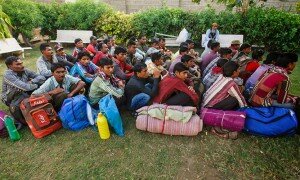 The Indo-Pak judicial committee on prisoners was formed in 2008, comprising four retired judges from each country. In the years to follow, Pakistani and Indian judges visited each other’s countries and met prisoners confined in respective jails.
The Indo-Pak judicial committee on prisoners was formed in 2008, comprising four retired judges from each country. In the years to follow, Pakistani and Indian judges visited each other’s countries and met prisoners confined in respective jails.
“According to Foreigner’s Act, the maximum punishment is ten-year imprisonment, but intention counts and most fishermen are given a six-month sentence, although they languish in prisons for much longer periods as detainees,” said one of the members of Pakistan-India Joint Judicial Committee on Prisoners while talking to Pique on the condition of anonymity as he was not authorized to issue any statement.
He termed fishermen’s arrests unfair. “These fishermen, most of them living below poverty line crossed over waters unintentionally for livelihood purposes. It’s a high price they pay for a small unintended crime. They are thrown into further destitution as their means of livelihood-boats are not released, he added. “The best step would be the maritime security agencies of both nations should warn them of crossing over and send them back to their respective waters,” he added.
The writer is Karachi-based journalist. He tweets @ZulfiqarKunbhar.





















































































